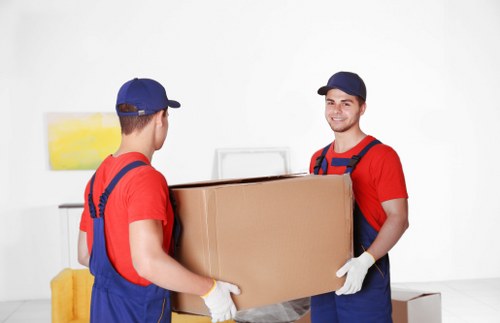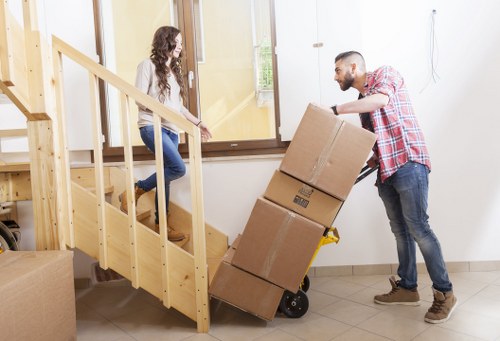Comprehensive Guide to Council Waste Collection in Woking

Living in Woking means being part of a vibrant community that takes pride in maintaining a clean and sustainable environment. Council waste collection plays a crucial role in ensuring that waste is managed efficiently and responsibly. This guide provides an in-depth look at how waste collection works in Woking, offering valuable information for residents to maximize their recycling efforts and reduce their environmental footprint.
Understanding the different types of waste and the correct disposal methods is essential. Woking Council provides a structured system to handle various waste streams, including general waste, recyclables, garden waste, and bulky items. By following these guidelines, residents can contribute to a cleaner, greener Woking.
In addition to regular waste collection, Woking offers special services such as recycling drops and hazardous waste disposal. These services ensure that all types of waste are managed appropriately, minimizing the impact on the environment and promoting public health.
Waste Collection Schedule

The waste collection schedule in Woking is designed to accommodate the needs of all residents. Understanding the schedule helps in organizing waste disposal effectively and avoiding missed collections.
General Waste Collection: Typically, general waste is collected fortnightly. Residents are provided with specific collection days based on their address.
Recycling Collection: Recycling is collected on a separate schedule, usually once a month. It's important to sort recyclables correctly to ensure they are processed efficiently.
- Glass and metal can be placed in designated recycling bins.
- Paper and cardboard should be flattened and placed in recycling containers.
- Plastic containers should be rinsed and sorted according to the council's guidelines.
Special Waste Collection Services

Woking Council provides additional services to handle waste that doesn't fit into regular collection schedules. These services include:
- Garden Waste Collection: Scheduled a few times a year, garden waste must be bagged and placed on the curb for collection.
- Bulky Waste Collection: Residents can schedule bulky waste pickups for items like furniture and appliances.
- Hazardous Waste Disposal: Special drop-off points are available for items like batteries, paints, and chemicals.
Using these services ensures that hazardous and bulky waste are disposed of safely and responsibly.
Recycling Initiatives

Woking is committed to promoting recycling and reducing landfill waste. The council has implemented several initiatives to encourage residents to recycle more effectively.
One such initiative is the provision of clearly labeled recycling bins, which make it easier for residents to sort their waste correctly. Educational campaigns and workshops are also held regularly to inform the community about the importance of recycling and how to do it properly.
Moreover, Woking Council collaborates with local businesses and organizations to enhance recycling efforts and develop sustainable waste management practices.
Tips for Effective Recycling

To make the most out of the recycling program in Woking, residents can follow these simple tips:
- Separate Your Waste: Keep recyclables separate from general waste to ensure they are processed correctly.
- Clean and Dry: Rinse containers and remove any food residue before recycling.
- Flatten Boxes: Reduces space in recycling bins, allowing more materials to be collected.
- Check Guidelines: Stay updated with the council's recycling guidelines to avoid contamination.
- Utilize Drop-Off Points: For items that cannot be collected regularly, use designated drop-off locations.
How to Schedule a Bulk Waste Pickup

Managing bulky waste can be challenging, but Woking Council offers a straightforward process for scheduling pickups. Residents can arrange bulk waste collection by:
- Visiting the Woking Council website and accessing the waste management section.
- Filling out the bulk waste request form with details of the items to be collected.
- Choosing a convenient date and time for the pickup.
- Following the guidelines for preparing bulky items for collection, such as ensuring they are accessible and placed safely on the curb.
Scheduling in advance helps the council manage resources efficiently and ensures timely collection.
Reducing Bulk Waste

Reducing the amount of bulky waste generated can ease the burden on waste collection services and the environment. Here are some strategies:
- Donate Usable Items: Before disposing of bulky items, consider donating them to local charities or recycling centers.
- Repair and Reuse: Fixing broken items extends their lifespan and reduces the need for disposal.
- Buy Second-Hand: Opting for second-hand items minimizes waste and promotes sustainable consumption.
These practices not only reduce waste but also foster a culture of sustainability within the community.
Responsible Hazardous Waste Disposal

Hazardous waste requires special handling to prevent environmental contamination and health hazards. Woking Council provides specific guidelines for disposing of such waste safely.
Residents should never mix hazardous waste with regular trash. Instead, utilize the council's hazardous waste collection points or attend designated collection events. Items considered hazardous include:
- Batteries
- Paints and solvents
- Electrical appliances
- Chemicals and fertilizers
Proper disposal of these items ensures they are managed in an environmentally friendly manner.
Benefits of Proper Hazardous Waste Management

Managing hazardous waste responsibly has several benefits:
- Protects the Environment: Prevents pollution of soil and water sources.
- Ensures Public Health: Reduces the risk of exposure to toxic substances.
- Promotes Recycling: Many hazardous materials can be recycled or reused when handled correctly.
- Complies with Regulations: Adheres to local and national waste management laws.
By following proper disposal methods, residents contribute to a healthier and safer community.
Educational Programs and Community Involvement

Woking Council believes that education and community involvement are key to effective waste management. Various programs are in place to educate residents about waste reduction and recycling practices.
Workshops and seminars are regularly organized to provide practical tips on minimizing waste, composting, and sustainable living. Additionally, community clean-up events encourage residents to take an active role in maintaining the cleanliness of their neighborhoods.
These initiatives foster a sense of responsibility and empower residents to make environmentally conscious decisions.
Schools and Waste Education

Schools in Woking play a pivotal role in waste education. Collaboration between the council and educational institutions ensures that children learn about the importance of waste management from an early age.
- Educational materials and resources are provided to schools.
- Interactive sessions and activities engage students in recycling and waste reduction.
- Schools are encouraged to implement recycling programs on campus.
By instilling good habits in young minds, the community ensures the future sustainability of waste management efforts.
Waste Reduction Strategies for Residents

Reducing waste is a collective effort that starts with small changes in daily habits. Woking residents can adopt the following strategies to minimize their waste output:
- Minimize Single-Use Items: Use reusable bags, bottles, and containers to cut down on single-use plastics.
- Compost Organic Waste: Composting kitchen scraps and garden waste reduces the amount of waste sent to landfills.
- Buy in Bulk: Purchasing items in bulk reduces packaging waste.
- Choose Sustainable Products: Opt for products made from recycled materials or that are easily recyclable.
- Repair Instead of Replace: Fixing broken items extends their life and reduces waste.
Implementing these strategies not only benefits the environment but also promotes sustainable living practices within the community.
Community Recycling Initiatives

Community-led recycling initiatives complement the council's efforts by fostering a collaborative approach to waste management.
Programs such as neighborhood recycling competitions, shared composting bins, and local recycling workshops encourage residents to participate actively. These initiatives create a sense of community and collective responsibility, making waste reduction a shared goal.
Moreover, partnerships with local businesses and organizations enhance the reach and effectiveness of these programs, ensuring widespread participation and maximum impact.
Technology and Innovation in Waste Management

Embracing technology and innovation is essential for advancing waste management practices in Woking. The council leverages modern solutions to optimize waste collection and processing.
Smart bins equipped with sensors monitor waste levels in real-time, allowing for more efficient collection routes and reducing unnecessary trips. Additionally, data analytics help the council identify trends and areas for improvement in waste management.
Innovative recycling technologies enable the conversion of waste into energy and other valuable resources, further enhancing sustainability efforts.
Future Plans for Waste Management

Woking Council is continually exploring new methods to improve waste management. Future plans include:
- Expanding Recycling Facilities: Increasing the capacity and capacity of recycling centers to handle more materials.
- Introducing Zero Waste Programs: Aiming to eliminate waste by encouraging reuse, recycling, and composting.
- Enhancing Public Awareness: Launching campaigns to educate residents about sustainable waste practices.
- Investing in Renewable Energy: Utilizing waste-to-energy technologies to generate renewable energy from waste.
These initiatives demonstrate the council's commitment to creating a sustainable and environmentally friendly Woking.
Nearby Areas and Their Waste Collection Services

Woking is surrounded by several nearby areas, each with its own unique waste collection services. Understanding the proximity and features of these areas can help residents collaborate on waste management efforts.
- Byfleet: Just west of Woking, Byfleet offers similar waste collection schedules and recycling programs, making it easy for residents to collaborate on bulk waste disposal.
- Brookwood: Located north of Woking, Brookwood provides specialized garden waste services, supporting the council's green initiatives.
- Marlow: South of Woking, Marlow has integrated composting facilities that complement Woking's waste reduction strategies.
- Knaphill: East of Woking, Knaphill benefits from the council's hazardous waste disposal events, ensuring safe waste management.
- Sheerwater: Adjacent to Woking, Sheerwater participates in community recycling programs, enhancing overall waste collection efficiency.
- Old Woking: Known for its historic sites, Old Woking manages waste with a focus on preserving the area's natural beauty.
- Hollins Green: Northwest of Woking, Hollins Green emphasizes sustainable waste practices through local initiatives.
- Pyrford: Northeast of Woking, Pyrford benefits from coordinated waste collection services that streamline recycling efforts.
- Canal View: A riverside area, Canal View integrates waste management with environmental conservation projects.
- West Byfleet: Expanding west, West Byfleet enhances waste collection with advanced recycling technologies.
- Oxted: Although slightly further, Oxted collaborates with Woking on regional waste management strategies.
- Brook Hill: Located to the southeast, Brook Hill supports the council's waste reduction campaigns.
- Uttoxeter Road: A bustling area, Uttoxeter Road efficiently manages waste with frequent collection services.
- Wingfield: Known for its parks, Wingfield aligns with Woking's green waste collection programs.
- Fernhurst: Southwest of Woking, Fernhurst participates in joint recycling initiatives with neighboring areas.
Benefits of Using Council Waste Collection Services

Utilizing the council's waste collection services offers numerous benefits to residents and the community at large.
- Convenience: Regular and scheduled waste collection ensures that waste is managed efficiently without residents needing to take extra steps.
- Environmental Protection: Proper waste management minimizes pollution, conserves natural resources, and supports recycling efforts.
- Health and Safety: Effective waste disposal reduces the risk of disease and maintains public hygiene standards.
- Economic Savings: Proper waste management can lead to cost savings for the council, which can be reinvested into community projects.
- Community Pride: Clean and well-maintained neighborhoods foster a sense of pride and belonging among residents.
These benefits underscore the importance of adhering to and supporting the council's waste collection services.
Supporting Sustainability Goals

Woking Council's waste collection services are integral to the community's sustainability goals. By promoting recycling, reducing landfill waste, and encouraging responsible disposal practices, the council is paving the way for a sustainable future.
Residents play a vital role in achieving these goals by actively participating in waste reduction efforts and adhering to the council's guidelines. Collective action ensures that Woking remains a clean, green, and sustainable town for generations to come.
Conclusion

Council waste collection in Woking is a well-organized and comprehensive system designed to manage waste effectively and sustainably. By understanding the schedules, utilizing special services, and participating in recycling initiatives, residents can contribute significantly to maintaining a clean and healthy environment.
Woking Council's commitment to waste management, combined with community involvement and innovative solutions, ensures that waste is handled responsibly and efficiently. Embracing these practices not only benefits the environment but also enhances the quality of life for all residents.
By staying informed and actively participating, everyone in Woking can help create a sustainable future and uphold the town's reputation as a model for effective waste management.
Frequently Asked Questions
1. How can I find out my waste collection day in Woking?
You can find your waste collection day by visiting the Woking Council website and entering your postcode in the waste collection schedule section.
2. What items are accepted in Woking's recycling program?
Woking's recycling program accepts glass, metal, paper, cardboard, and certain plastics. It's important to follow the council's guidelines to ensure all materials are recyclable.
3. How do I schedule a bulky waste pickup?
To schedule a bulky waste pickup, visit the council's website, fill out the bulk waste request form, and select a suitable date and time for collection.
4. Where can I dispose of hazardous waste in Woking?
Hazardous waste can be disposed of at designated drop-off points provided by Woking Council or during scheduled hazardous waste collection events.
5. Are there any recycling workshops available in Woking?
Yes, Woking Council regularly organizes recycling workshops and educational programs. Check the council's website or contact the local council office for upcoming events.